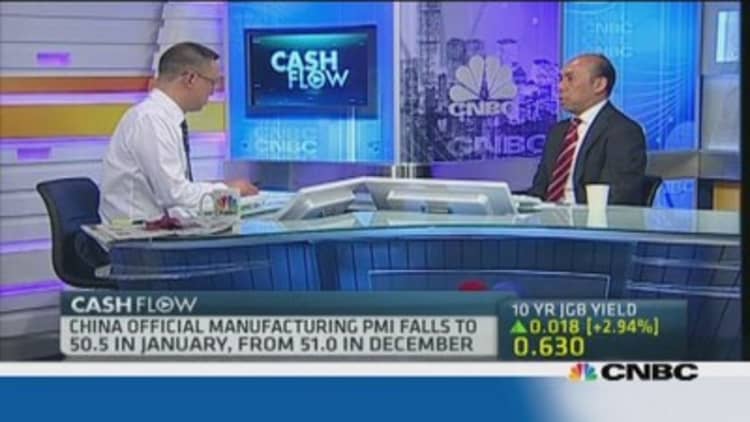With many investors blaming the Federal Reserve for the recent emerging market rout, analysts told CNBC that China may come to the rescue.
"China will be the real driver of an emerging market rebound, it will be its savior," said Paul Krake, founder of View from the Peak: Macro Strategies.
"A reduction in the Fed's asset-purchase program is a concern but well telegraphed... While not the panacea for deficit emerging market economies, a Chinese rebound is a tremendous help both in terms of export recovery and asset market sentiment," he added.
(Read More: Why China stocks are dodging the global market rout)
Emerging markets have seen a brutal sell-off this year after sharp falls in the value of the Argentine peso, Turkish lira, South African rand and Brazilian real triggered panic selling across the asset class. Analysts largely blamed the turbulence on the Fed's tapering measures, the first hint of which last year sent risk assets worldwide into a tizzy.
But worries about China have been another key reason for the selloff, as fears over the nation's problematic shadow banking industry and a number of weaker-than-expected data points have once again ramped up concerns of a hard landing scenario.
Krake said China's economic outlook was far more crucial to emerging markets' recovery than the Fed's monetary policy, and a bounce back there would be the key trigger for a rebound. He said investors sometimes underestimated Chinese policy makers' ability to manage its credit issues.
(Read More: Rich Chinese buy visas in US and Australia)
"China will not sit idly by and allow tighter credit conditions to derail economic activity. Therefore a policy response designed to achieve the 7 to 7.5 percent growth floor appears imminent," he said.
"A healthy banking system and robust credit growth would be positive for commodities and take pressure off many emerging markets," he added.
China's gross domestic product (GDP) expanded 7.7 percent last year, its lowest level since 1999. Policy makers have made it clear they want their economy to slow to more sustainable levels, but many analysts are worried China is on the brink of a sharp uncontrolled slowdown while fears about the economy's huge credit problems have been stoked by spikes in the interbank lending rate last year.
(Read More: Fed volatility is emerging markets' 'poison': Analyst)
However, Robert Prior-Wandesforde, director of non-Japan Asia economics at Credit Suisse, told CNBC a rebound in China's economy would not necessarily be positive for all emerging markets and the impact would be more complicated.
"If China bounces back with much stronger growth, then it will be helpful for the Asian economies which heavily export commodities to China, like Indonesia," he said. "However, big commodity importers like India will be a key loser in that situation."

Prior-Wandesforde added that it wasn't clear whether China was going to be able to bounce back this year. Credit Suisse's China economist Tao Dong recently downgraded his forecast for 2014 GDP growth from 7.7 percent to 7.3 percent, on the basis that a very weak first quarter would drag the annual figure down, on weaker data and lackluster consumer spending over Chinese New Year.
Meanwhile, if China were to surprise on the downside it could benefit large commodity importers, Prior-Wandesforde added, as commodity prices take a beating.
(Read More: Copper's swoon - Bad omen for China?)
But any signs of a more systematic financial crisis in China would have more global ramifications, Prior-Wandesforde pointed out.
In Credit Suisse's view, the risk of a more widespread crash would be more severe if policy makers were to embark on a more aggressive monetary tightening path.
Meanwhile, Richard Jerram, chief economist at the Bank of Singapore said in his view China is more likely to be part of the problem rather than contributing to a solution.
"To me it seems naïve to believe that the government can have whatever growth rate it wants. We have seen that the growth in China is increasingly driven by credit, while declining productivity of investment is making it harder to service the debt. This is not a sustainable model," he added.
(Read More: How big is China's economy, really?)
— By CNBC's Katie Holliday: Follow her on Twitter @hollidaykatie


